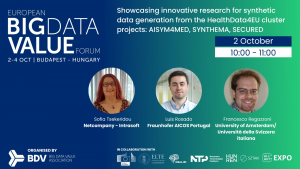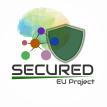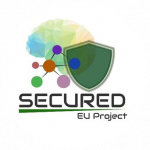Showcasing innovative research for synthetic data generation from the HealthData4EU cluster projects: AISYM4MED, SYNTHEMA, SECURED
SECURED Coordinator, Dr. Francesco Regazzoni, will be representing the project at EBDVF24 in the session:
“Showcasing Innovative Research for Synthetic Data Generation from HealthData4EU Cluster Projects: AISYM4MED, SYNTHEMA, SECURED”, along with partners Dr. Luis Rosado (AISYM4MED) and Dr. Sofia Tsekeridou (SYNTHEMA). The session will be moderated by Ms. Serena Battaglia, Project Adviser – European Health and Digital Executive Agency (HaDEA).



Room Black, Crown Plaza Budapest
Join the session or stop by the HealthData4EU booth to connect with us throughout the Forum!
Description
The session will cover innovative approaches and results from key projects of the HealthData4EU Cluster, each with distinct objectives.
- The AISYM4MED project will focus on evaluating the realism, representativeness, and usefulness of synthetic medical data. It will introduce an open-source library for data auditing, featuring metrics for assessing synthetic data quality across various modalities, and present preliminary findings on how the platform can assist healthcare professionals.
- The SYNTHEMA project will address accessing scarce data to generate synthetic data securely and, in a privacy-preserving manner, focusing on federating scarce data to enhance synthetic data generation, reduce biases, and improve data quality, particularly for rare diseases. She will also explore the technology supporting secure and privacy-preserving federated training of synthetic data generation models, considering ethical and legal constraints.
- Lastly, the SECURED project will provide an overview of privacy-preserving technologies for health applications, summarizing their advantages and limitations, and evaluating their suitability for health applications while highlighting challenges and opportunities in the domain.
AISYM4MED – Dr. Luis Rosado
How to evaluate realism, representativeness, and usefulness of synthetic medical data?
Data auditing is essential for ensuring the reliability of machine learning models by maintaining the integrity of the datasets upon which these models rely. As synthetic data use increases to address data scarcity and privacy concerns, there is a growing demand for a robust auditing framework. This talk will cover ongoing research in the AISym4Med project regarding quality evaluation of synthetic medical data.
In the first part of the talk, we will present how AISym4Med platform aims to automatically evaluate synthetic medical data. We will present our new open-source library for data auditing, which includes a comprehensive suite of metrics designed for evaluating synthetic data. This library also extends to the quality assessment of input data, whether synthetic or real, across various modalities such as time series, tabular, and image data.
The second part of the talk will highlight how the AISym4Med platform aims to assist healthcare professionals in evaluating synthetic medical data. We will present preliminary findings from our user research on how we envision supporting healthcare professionals to assess the realism, representativeness, and usefulness of synthetic medical data.

SYNTHEMA – Dr. Sofia Tsekeridou
How do we access scarce health seed data of rare diseases to generate synthetic data in a secure and privacy-preserving manner?
Data scarcity is a significant bottleneck towards optimally training efficient and unbiased AI models. Such case is primarily encountered in rare diseases with a relatively low number of patients within a region/country, who are entitled to optimal diagnosis, health monitoring and treatment tools, while the confronted data silos in unconnected clinical sites and health registries significantly worsen the situation. Coupled with the pressing requirement for privacy, security and data protection of sensitive health data, it is evident that solutions need to be devised to address data scarcity and data silos during synthetic data generation processes.
In this talk, the Horizon Europe SYNTHEMA innovative platform will be presented, proposing an effective solution to access scarce data in a distributed manner from dispersed clinical sites and health registries in order to efficiently train synthetic data generation engines deploying federated learning approaches while tackling aspects both of security in sharing information across the nodes of the distributed and federated data and learning ecosystem as well as of privacy that is of high concern when accessing and using sensitive health data. Federation of scarce data across clinical sites and cross-border, federated training of AI models enables synthetic data generation while reducing biases/increasing synthetic data quality. The main aim of SYNTHEMA is to generate reliable, high-quality synthetic data that can shape new virtual patients to further enhance diagnostic capacity, assess treatment options and predict outcomes in rare hematological diseases.
SECURED – Dr. Francesco Regazzoni
Privacy Preserving Technologies for health applications
Several privacy preserving technologies are being deployed in the last years. What are the main privacy preserving techniques? Which ones are their main advantages and limitations? Are they suitable for health applications? In this talk we aim to give a short summary of the privacy preserving techniques in health domain highlighting challenges and opportunities.
Agenda
10.00 am | Welcome and Introduction | Ms. Serena Battaglia Project Adviser – European Health and Digital Executive Agency (HaDEA) |
10.05 am | How to evaluate realism, representativeness, and usefulness of synthetic medical data? (AISYM4MED) | Dr. Luis Rosado (Fraunhofer AICOS Portugal) |
10.20 am | How do we access scarce health seed data to generate synthetic data in a secure and privacy-preserving manner? (SYNTHEMA) | Dr. Sofia Tsekeridou (Netcompany – Intrasoft, Greece) |
10.35 am | Privacy Preserving Technologies for health applications (SECURED) | Dr. Francesco Regazzoni (University of Amsterdam, Netherlands and Università della Svizzera italiana, Italy) |
10.45 am | Q&A Moderator: Ms. Serena Battaglia | Dr. Luis Rosado Dr. Sofia Tsekeridou Dr. Francesco Regazzoni |
SPEAKERS OF THIS SESSION
 Dr. Francesco Regazzoni
Dr. Francesco Regazzoni EU project coordinator at University of Amsterdam, Netherlands and Università della Svizzera italiana, Switzerland



